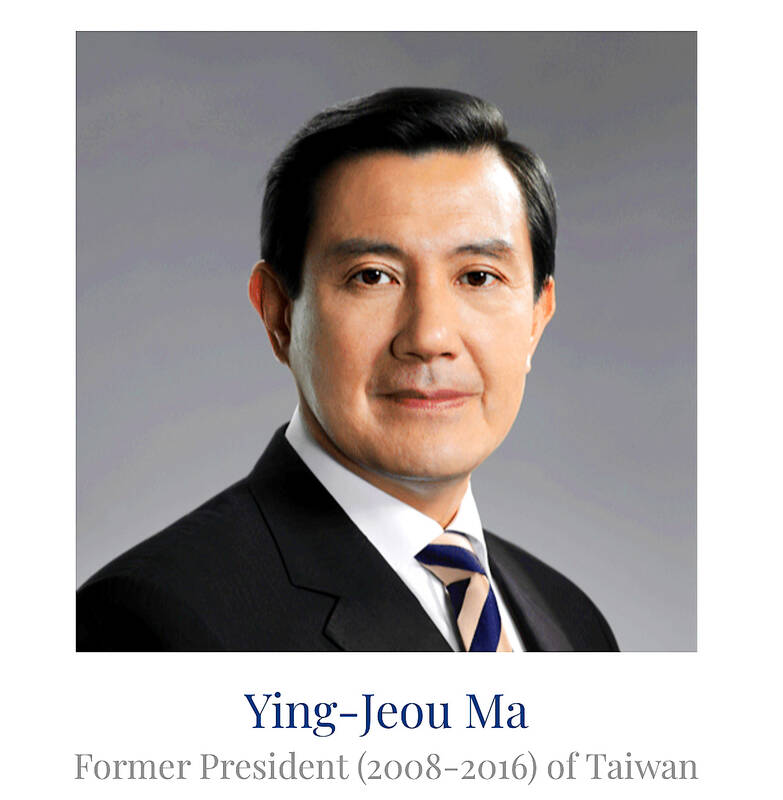The Delphi Economic Forum yesterday corrected Ma Ying-jeou’s (馬英九) title on its Web site from “former president of Taipei” to “former president of Taiwan” following calls from the Ministry of Foreign Affairs and Ma’s office about the error.
The change was made within hours of the Ma’s profile appearing on the forum’s site, with the original wording prompting criticism from the Democratic Progressive Party (DPP).
Premier Chen Chien-jen (陳建仁) said the mistaken title was inappropriate and a “serious error.”

Photo: screen grab from the Delphi Economic Forum Web site
Ma’s office yesterday said the invitation to address the forum had referred to Ma as “former president of the Republic of China,” and that it had asked the forum to correct the error when it was spotted.
Ma’s office said it thanked the ministry for moving quickly to request a correction from the forum.
“It is important for non-governmental groups to speak to the world even when President Tsai Ing-wen’s (蔡英文) government has been unable,” Ma’s office said.
Ma is scheduled to talk at the forum about how to achieve peace with China in ways that differ from the DPP’s approach, his office said on Thursday last week.
Ma’s seeming acceptance of “Taiwan” over “Republic of China” in the corrected title contradicts his stance that both sides of the Strait acknowledge there is “one China,” with each side having its own interpretation of what “China” means, DPP Legislator Su Chiao-hui (蘇巧慧) said.
Tsai’s “pragmatic diplomacy” has garnered support for Taiwan from a “global alliance of democratic countries,” while she has met two serving speakers of the US House of Representatives and secured an invitation to the APEC leaders’ summit, Su said.
“The choice put before Taiwan in 2024 will be to follow the worn-out cross-strait policy of Ma from Taipei or President Tsai of Taiwan,” she said. “The right choice cannot be more obvious.”

Taiwan is to commence mass production of the Tien Kung (天弓, “Sky Bow”) III, IV and V missiles by the second quarter of this year if the legislature approves the government’s NT$1.25 trillion (US$39.78 billion) special defense budget, an official said yesterday. Commenting on condition of anonymity, a defense official with knowledge of the matter said that the advanced systems are expected to provide crucial capabilities against ballistic and cruise missiles for the proposed “T-Dome,” an advanced, multi-layered air defense network. The Tien Kung III is an air defense missile with a maximum interception altitude of 35km. The Tien Kung IV and V

The disruption of 941 flights in and out of Taiwan due to China’s large-scale military exercises was no accident, but rather the result of a “quasi-blockade” used to simulate creating the air and sea routes needed for an amphibious landing, a military expert said. The disruptions occurred on Tuesday and lasted about 10 hours as China conducted live-fire drills in the Taiwan Strait. The Civil Aviation Administration (CAA) said the exercises affected 857 international flights and 84 domestic flights, affecting more than 100,000 travelers. Su Tzu-yun (蘇紫雲), a research fellow at the government-sponsored Institute for National Defense and Security Research, said the air

A strong continental cold air mass is to bring pollutants to Taiwan from tomorrow, the Ministry of Environment said today, as it issued an “orange” air quality alert for most of the country. All of Taiwan except for Hualien and Taitung counties is to be under an “orange” air quality alert tomorrow, indicating air quality that is unhealthy for sensitive groups. In China, areas from Shandong to Shanghai have been enveloped in haze since Saturday, the ministry said in a news release. Yesterday, hourly concentrations of PM2.5 in these areas ranged from 65 to 160 micrograms per cubic meter (mg/m³), and pollutants were

Taiwan’s armed forces have established response protocols for a wide range of sudden contingencies, including the “Wan Chun Plan” to protect the head of state, the Ministry of Defense (MND) said today. After US President Donald Trump on Saturday launched a series of airstrikes in Venezuela and kidnapped Venezuelan President Nicolas Maduro, concerns have been raised as to whether China would launch a similar “decapitation strike” on Taiwan. The armed forces regularly coordinate with relevant agencies and practice drills to ensure preparedness for a wide range of scenarios, Vice Minister of National Defense Hsu Szu-chien (徐斯儉) told reporters before a